|
Health Watch
Healthy food for healthy pregnancy
Nithya Ramakrishnan Department of Applied Nutrition Wayamba
University of Sri Lanka
The nine months of pregnancy is the most rapid period of growth and
development among the life stages of human beings.

Most of the factors that affect the pregnancy period can be
controlled. One of the important factors among them is nutrition during
pregnancy. The most priceless gift that a mother can give her baby is a
nutritious and well balanced diet. Adapting a healthy eating plan is
ideal but equal concern should be given during and after pregnancy to
ensure the wellness of both mother and baby.
Pregnancy is the period in our life where the eating habits of one
directly affects the other. There is a myth that ‘if a woman gets
pregnant, she should eat twice.’ It is totally a wrong concept and the
truth is that mother should consume food that are sufficient for two
lives. During pregnancy the nutritional needs of a mother is increasing.
Almost all the requirements for all nutrients do increase, but among
them, some are vital for the pregnancy period such as protein, iron,
calcium and folic acid. (See Table)
Iron-rich foods
Hemoglobin in the red blood cell carries oxygen and nutrients to the
cells. The hemoglobin molecule contains iron, an essential mineral found
in our diet. The requirement of iron doubles during pregnancy, and to
meet that requirement the pregnant mother should eat iron- rich food
items. Food items which have higher amounts of iron are shown in the
table. Liver provides a higher amount of iron but it contains higher
amounts of Vitamin A too. Because of that, the health professionals
advise to avoid liver, it may affect the growth of baby, in certain
instances it would even cause a miscarriage.
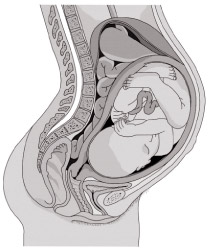
Iron present in animal sources are much easier to absorb but in the
case of plant sources, it is difficult. Vitamin C enhances the
absorption of iron in the plant source, so better to incorporate Vitamin
C rich food items with the meal.
Most of the fruits are rich in Vitamin C. Furthermore Vitamin C
prevents both the mother and baby from infections. Drinking tea during
the meal or immediately after having the meal may reduce the absorption
of iron.
Folic acid is another crucial nutrient during this stage as it is
important for the growth and development of the baby. Adequate folic
acid consumption is important before conception and at least for 3
months afterwards. If a woman fails to take enough Folic acid during
this particular time, she faces the risk of having a baby with a birth
defect involving incomplete development of brain and spinal code.
This kind of defect will occur during the first 28 days of pregnancy
(during this period a woman does not know that she is pregnant.) All the
women in the child - bearing age should have adequate amount of Folic
acid to reduce the risk of having a baby with defects whether they plan
to have a baby or not because most of the pregnancies in Sri Lanka are
unplanned.
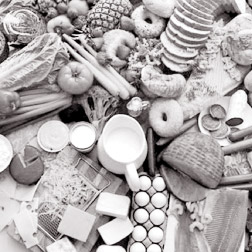
Folic acid rich food items are listed in the above table. Folic acid
requirement for a day cannot be achieved through a usual diet.
Therefore, it is more beneficial to take Folic acid supplement under the
advice of a health care provider. Another important nutrient during
pregnancy is Calcium. It is important for both mother and the baby.
Calcium is essential to build up strong bones and teeth, for nerve and
muscle development as well as normal heart functioning of the baby.
Furthermore Calcium is stored in the body to prepare the body for
breastfeeding.
If a pregnant mother doesn't get enough Calcium from her meal, baby
will draw it from mother's bones. It may cause serious consequences to
the mother in later years.
Especially there is a risk of developing osteoporosis- like bone
conditions. Because of that an adequate amount of Calcium should be
taken by a pregnant woman. Calcium rich food items are listed in the
above table. Incorporate Calcium rich food items in an appropriate level
is important.
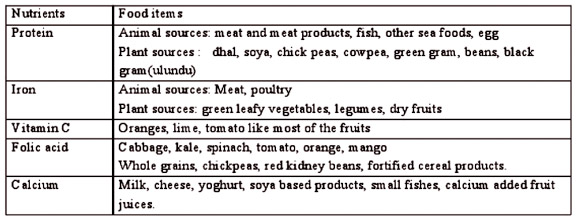
In addition to the above mentioned nutrients, other nutrients are
also needed in higher amounts than the normal requirement. Each and
every pregnant mother should take a well-balanced diet consist of
adequate amounts of whole grain, lean meats (visible fat removed), fish
and egg, milk and dairy products, legumes, a variety of vegetables and
fruits. Another important aspect during the pregnancy is appropriate
weight gain.
During this period, body changes will occur to facilitate the growth
of the baby. It is amazing to feel that your weight begins to increase
and it is considered as a proof that your body is nurturing your growing
baby well.
To accomplish all these changes body needs extra 300 cal per day
during the 2nd and 3rd trimester of pregnancy. It can be achieved by
eating a well- balanced diet.
However needs for the energy requirement may differ from individual
to individual based on their pre pregnancy body weight. It is better to
discuss with a health - care provider and it is essential to follow
his/her advice to gain appropriate weight. As a whole nutrition during
pregnancy should be given priority to enhance the well being of both
mother and baby, to deliver a healthy baby, complication free labor and
to get rid from nutrition related diseases during pregnancy and non
communicable diseases in later life.
Eating fast food cause for childhood asthma and allergies
Teenagers more likely to have severe asthma and eczema if they eat
fast food more than three times a week, study shows
|

Young boy using asthma inhaler |
An international collaboration of scientists has found that young
teenagers in particular are nearly 40% more likely to have severe asthma
if they eat burgers and other types of fast food more than three times a
week. Children aged six to seven had an increased risk of 27%. Children
eating fast food were also more likely to get severe eczema and rhinitis
- a condition where the nose blocks or runs and the eyes are itchy and
water.
The scientists, from New Zealand, Spain, Australia and Germany as
well as Nottingham in the UK, say their study could have “major public
health significance owing to the rising consumption of fast foods
globally” if the link they have found turns out not to be coincidence
but causal.
The good news was that eating fruit appeared to protect young people
from asthma and allergies. Eating three or more portions a week reduced
the severity of the symptoms by 11% among teenagers and 14% among
younger children.
The research, published in the journal Thorax, part of the BMJ group,
came out of a large collaborative project called the International Study
of Asthma and Allergies in Childhood (ISAAC), which involves nearly 2
million children in more than 100 countries, making it the biggest of
its kind.
The fast food study involved a relatively small proportion of the
children taking part in ISAAC, from two age groups: 319,000 13- to
14-year-olds from 51 countries and 181,000 six- to seven-year-olds from
31 countries.
|
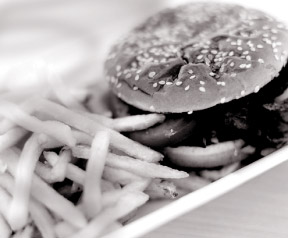
Close-up of a hamburger with french-fries on a plate |
The children and their parents were sent questionnaires about their
eating habits over the previous 12 months.
They were asked how often they had eaten specific foods, including
meat, fish, fruit and vegetables, pulses, cereals, bread and pasta,
rice, butter, margarine, nuts, potatoes, milk, eggs, and fast
food/burgers. They were also asked whether and how often they suffered
from specific asthma and allergy symptoms - and if so, how severe they
were and whether they stopped them sleeping or interfered with daily
life.
Fast food - the authors specifically mentioned burgers only because
it was the reference to fast food that most people would understand -
was the only food type associated with asthma and allergies across all
age ranges and countries. The authors said that “such consistency adds
some weight to the possible causality of the relationship”. But they
said more research would be needed to discover whether fast food is
definitely a problem.
The fast food link was stronger among teenagers than among the young
children, which the authors suggest may be because adolescents have more
independence, money and control over what they eat.
The paper says a link between fast food and asthma and allergies is
biologically plausible.
It could be “related to higher saturated fatty acids, trans fatty
acids, sodium, carbohydrates and sugar levels of fast food and possibly
preservatives”. Fast foods have high levels of industrially hydrogenated
vegetable fats such as margarine, which can be a source of trans fatty
acids - “and there is some evidence that dietary intake of trans fatty
acids is associated with asthma and allergy”, say the authors. In the
teenagers, eating butter, margarine and pasta was also associated with
asthma symptoms.
Studies which involve asking people about their diet can be
problematic, because people either forget or tailor the truth. Professor
Hywel Williams, from the centre of evidence-based dermatology at
Nottingham University, said recall over the 12 months of the study was
more likely to be inaccurate than biased and this would tend to dilute
any association between fast food and asthma, rather than the reverse.
“Now if there was a widespread belief already out there that fast
foods are ‘bad’ for allergies, then you could say the data was simply
reflecting such prior prejudices/beliefs. But we are not aware of any
such widespread prior belief. People often believe fast foods are
associated with things like acne, obesity and hyperactivity, but not
allergies, and severe allergies at that. And even if one country had
such a belief, how could you explain such consistency across so many
countries and cultures and socio-economic groups?”
The study did not differentiate between types of fast food. “Our
question simply asked, ‘In the past 12 months, how often, on average,
did you (did your child) eat or drink the following: meat; seafood;
fruit; vegetables (green and root); pulses (peas, beans, lentils);
cereal; pasta (including bread); rice; butter; margarine; nuts;
potatoes; milk; eggs and fast food/burgers?’,” he said. “So we could
analyse each of these categories, but not split them down any further.
“And before we put the boot into burgers specifically, it does not
mean they are always “fast” as some of us (including me) make very
nutritious “slow” burgers at home - but it seemed like a well understood
anchor for fast foods since burgers are one of the commonest types of
fast food sold around the world.”
Malayka Rahman, from Asthma UK, said: “This research adds to previous
studies that suggest a person's diet can contribute to their risk of
developing asthma, and indicates the benefit of further research to
determine the effects that particular food groups can have on the
chances of developing asthma or the impact it may have on severity.
Evidence suggests that the vitamins and antioxidants found in fresh
fruit and vegetables have a beneficial effect on asthma, therefore
Asthma UK advises people with asthma to eat a healthy, balanced diet
including five portions of fruit or vegetables every day, fish more than
twice a week, and pulses more than once a week.”
Many parents of children with asthma and allergies will already be
watching carefully their child's diet since certain foods - notoriously
nuts - are known to trigger allergic reactions.
With news that studies show apparently bland burgers, nuggets,
pasties and similar fast foods could contribute to the risk, they will
be keen to know what research suggests are the safer options for family
dinners.
One better bet appears to be a Mediterranean diet. Asthma UK cites
research into diet and asthma arried out in Athens in 2011 by
Grigoropoulou and colleagues, which compared school children in the city
with those in a rural part of Greece. They found that the urban children
were more likely to get asthma, but eating a Mediterranean diet, rich in
vegetables, fish and oils, appeared to protect them.
Fish oils on their own, however, did not do so well in a study from
Edinburgh University published in 2009.
This was a review of a number of studies where children had been
given omega 3 and omega 6 supplements in the hope of preventing
allergies, while other comparable children had been given placebos -
dummy pills.
The researchers found no clear evidence that the supplements had any
protective effect.
“Contrary to the evidence from basic science and epidemiological
studies, our systematic review and meta-analysis suggests that
supplementation with omega 3 and omega 6 oils is probably unlikely to
play an important role as a strategy for the primary prevention of
sensitization or allergic disease,” they concluded.
Trans fatty acids have been linked to asthma and allergies before, in
addition to raising cholesterol levels and the NHS advises people to
reduce their intake. The fast food study suggests that the best advice
for parents wanting to protect their children from asthma and allergies
is to try to ensure they have a generally healthy diet, with plenty of
fruit and hopefully some vegetables, and to steer clear of fast food
restaurants.
-Guardian.co.uk
Weuda PMCU wins an excellence award
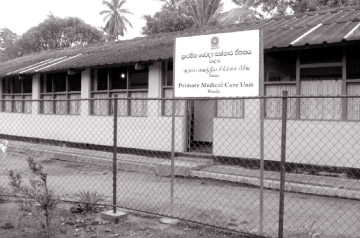
Weuda PMCU, Kandy Road, Kurunegala |
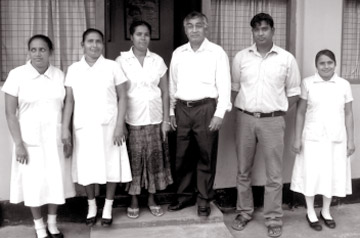
Staff of Weuda PMCU |

Dr. A. Weerasinghe receives the award |
Tharindu Weerasinghe Well managed Weuda (Kurunegala) Primary Medical
Care Unit
PMCU has won one of the excellence awards at the Health Excellence
Awards 2012 (North Western Province) organized by the Department of
Health Services (North Western Province) held recently.
Chief Guest of the function was Minister of Health Maithripala
Sirisena and the guests of honor were:
North Western Province Governor (NWP) Thissa R. Balallla , Chief
Minister of NWP Athula Wijesinghe, Minister of Health, Indigenous
Medicine, Sports & Youth Affairs of NWP Ashoka Wadigamangawa .
The staff of the Weuda PMCU headed by Dr.A.Weerasinghe (RMO
in-charge) was very happy about their achievement as they work with
dedication and integrity to give the maximum support to the villagers
for their medical problems and requirements.
This is a good example for other health units around the country. |







